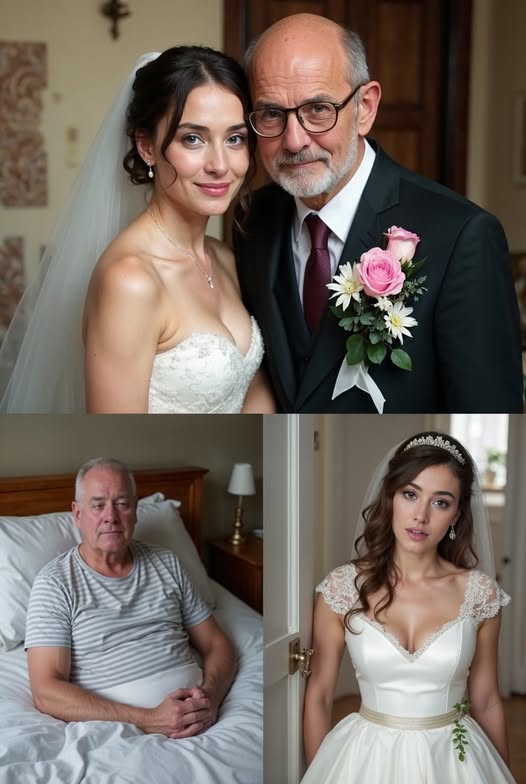The Grand Palace shimmered with crystal chandeliers, marble floors, and the soft hum of champagne glasses clinking against one another as laughter echoed through its golden halls. Among the luxury and celebration stood Emily, a young student barely into adulthood, dressed in a flowing designer gown that felt more like a costume than a bridal dress.

Her hand rested in that of Richard Sterling, a 60-year-old millionaire whose confidence and power filled the room. His appearance was polished—diamond cufflinks, a tailored suit, and an aura of absolute control. Emily’s parents stood nearby, radiant with satisfaction, their dreams of wealth and security realized through their daughter’s marriage. But for Emily, the lavish setting and proud smiles only underscored the truth—this wasn’t a love story, it was a contract. She had become a symbol of a deal, a young woman traded for stability, her own hopes quietly set aside. “You look beautiful,” Richard whispered as they exchanged vows under a golden arch.
“Perhaps, with time, we’ll find understanding.” Emily forced a nod, her mind drifting to the dreams she had abandoned—freedom, education, the kind of love that wasn’t tied to power or appearances. That night, she walked through his grand estate filled with velvet drapes and antique gold accents, following him into the master bedroom with a mixture of dread and uncertainty. The silence was thick, and her heart pounded. He looked at her not with desire, but with an intensity that chilled her. “There’s only one thing I ask of you tonight,” he said quietly. “Promise me you’ll never enter my study. No matter what you hear. No matter what curiosity stirs.
That door must remain closed.” His tone was calm but carried a weight that settled in her bones. She nodded, whispering a promise that left her unsettled. For a moment, she thought she glimpsed sadness behind his cool exterior before he turned away. In the days that followed, life shifted into a strange rhythm. Richard gave her everything—luxury clothes, sparkling jewelry, a personal driver, and even encouraged her to return to school. Yet his emotional walls never crumbled. He was generous in material ways, but remained distant, often away for long stretches under the pretense of business.
The mansion was quiet, the staff obedient and silent, and the mystery of the locked study loomed large in Emily’s mind. Then one afternoon, Emily returned home to flashing lights and an ambulance in the driveway. Richard had collapsed inside his forbidden study and was rushed to a private hospital. As the medics wheeled him out, the study door hung ajar, revealing candlelight, shelves lined with worn books, and a black-and-white photograph on the desk of a woman who looked hauntingly like Emily. After regaining consciousness, Richard thanked her in a whisper. When she gently asked about the room and the photograph, he only said, “We’ll talk at home.”
But even back at the mansion, no explanations came. Her curiosity grew until one day, when Richard was away and the staff preoccupied, she slipped into the study. The room was preserved like a shrine. Dust-covered books, yellowed letters, and the lingering scent of old perfume filled the air. She picked up the photo—the same woman with her eyes and smile. On the back, in faded ink, were the words: “My beloved Isabella, 1978.” A voice startled her from behind. “I told you not to come in here.” Richard stood at the doorway, leaning on a cane, his expression unreadable. “Who was she?” Emily asked. He took the photo with shaking hands.
“She was my first love. We met in college. I proposed before I was deployed. She died while I was away. I never forgave myself.” His voice cracked as he continued, “You look like her. That’s why I married you. I was chasing something I lost.” Emily took a deep breath. “I’m not Isabella, Richard. If you want a future with me, you need to let her go.” For the first time, he looked at her not as a memory, but as a person. He nodded. From that moment, something changed.
He began to listen more, speak less, and slowly see Emily as her own person, not a replacement. He encouraged her to study abroad, to travel, to find herself. “Live your life,” he said. “If you choose to come back, I’ll be waiting—not as your owner, but as your partner.” And so she left, chasing the future that once felt out of reach. Though she traveled far and discovered new dreams, she never forgot Richard—not as the man who bought her freedom, but as the man who finally understood that love is not about control, but about letting go.





